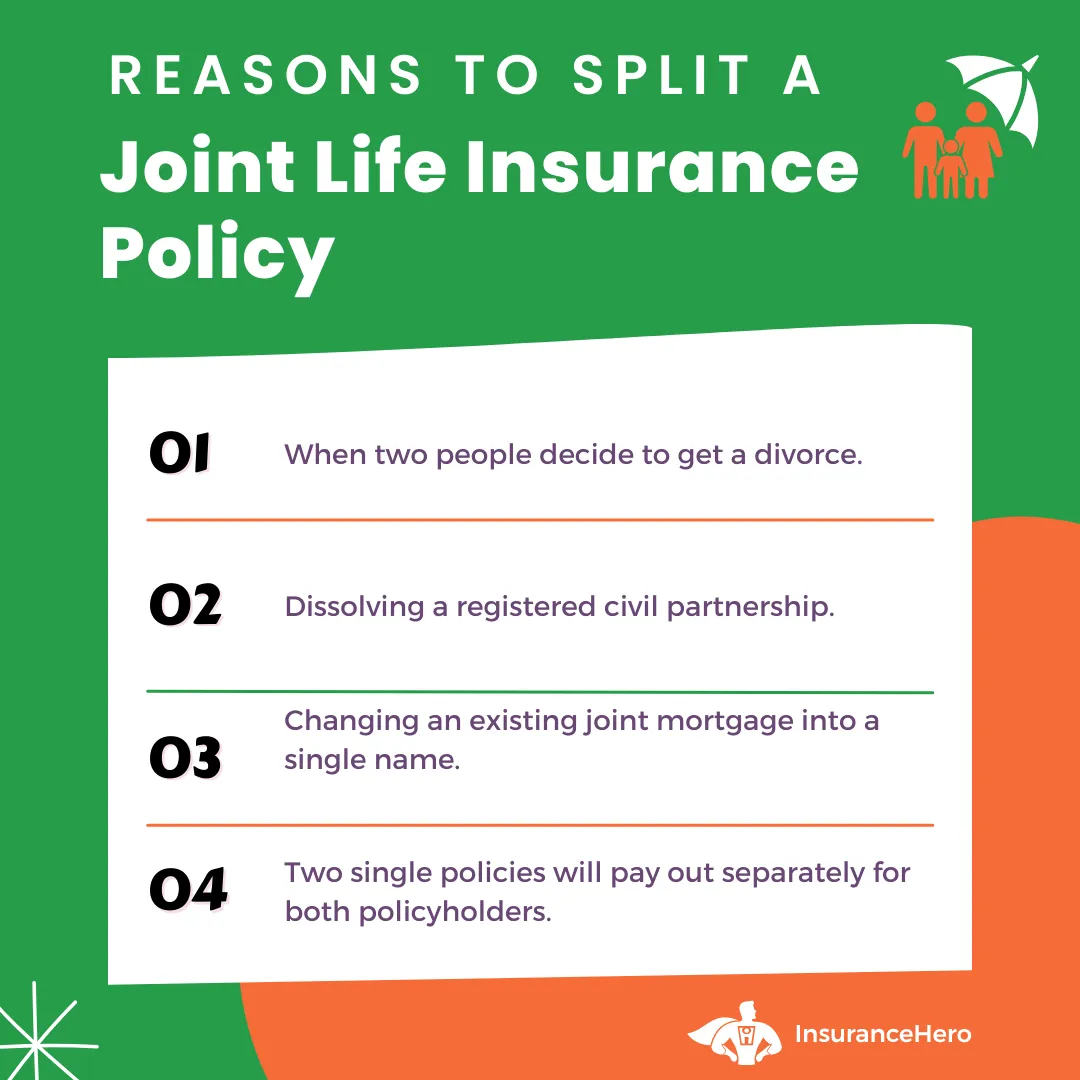What Happens To Life Insurance After Divorce?

Divorce can be complex and challenging, and it often has significant implications for your financial planning, including your life insurance.
This life insurance after divorce guide will provide you with essential tips to help you navigate the intersection of life insurance and divorce in the UK.
A brief overview of life insurance
Life insurance is a financial product designed to provide a lump sum payment to beneficiaries upon the policyholder’s death.
It can help cover funeral costs, replace lost income, and ensure financial stability for loved ones.
Importance of life insurance in divorce
Life insurance is important during and after a divorce, as it can help protect your children and other dependents from financial hardship in the event of your death.
It can also serve as a tool to secure maintenance and child support payments.
Are you worried That Your Current Life Insurance Is Invalid? Research New Cover For Your New Life And Save Money
⏱ Enquiry Form Takes About 60 Seconds

Understanding the types of life insurance policies
Term life insurance
Term life insurance covers a specified term, typically ranging from 10 to 30 years. The beneficiaries receive a death benefit if the policyholder dies during this period. If the term ends and the policyholder is still alive, the coverage expires without payout.
Level term insurance
Level term insurance is a type of term life insurance where the death benefit remains constant throughout the term.
Decreasing term life insurance
Decreasing term life insurance has a death benefit that decreases over the policy’s term, typically in line with a repayment mortgage.
Whole life insurance
Whole life insurance covers the policyholder’s entire life as long as premiums are paid. It often includes a cash value component that can be borrowed against or withdrawn.
Over 50s life insurance
Over 50s life insurance is a type of whole life insurance specifically designed for individuals aged 50 and over, often with guaranteed acceptance and no medical underwriting.
Factors Affecting Life Insurance Premiums:
| Factor | Description |
|---|---|
| Age | Older individuals pay higher premiums |
| Gender | Women generally pay lower premiums |
| Health | Pre-existing conditions can increase premiums |
| Smoking Status | Smokers pay higher premiums |
| Occupation | High-risk occupations can sometimes lead to higher premiums |
| Policy Type | Premiums vary depending on the type of life insurance |
The impact of divorce on life insurance policies
Changing beneficiaries
After a divorce, you may want to change your life insurance policy’s beneficiaries to ensure the death benefit goes to the appropriate parties, such as your children or a new spouse.
Policy Ownership
Policy ownership determines who controls the life insurance policy, including the ability to change beneficiaries, adjust coverage, or cancel the policy. It’s important to establish ownership of the policy during the divorce process.
Reviewing your life insurance needs
Assessing your financial situation
After a divorce, your financial situation may change, which can impact your life insurance needs. Review your income, expenses, assets, and debts to determine the appropriate coverage amount.
Adjusting coverage amounts
If your financial situation has changed significantly, you may need to adjust your life insurance coverage to ensure adequate protection for your dependents.
Divorce Statistics In The UK:
| Year | Divorce Rate (per 1,000 marriages) | Average Marriage Duration (years) |
|---|---|---|
| 2019 | 7.5 | 12.5 |
| 2020 | 7.6 | 12.3 |
| 2021 | 8.9 | 11.7 |
| 2022 | 9.0 | 11.8 |
Ensuring financial security for children
Naming children as beneficiaries
You can name your children as beneficiaries of your life insurance policy to ensure they receive financial support in the event of your death.
Establishing a trust
Setting up a trust for your life insurance proceeds can help ensure the funds are managed responsibly for the benefit of your children, especially if they are minors.
The importance of updating your will
Revising estate planning documents
After a divorce, it’s crucial to update your will and other estate planning documents to reflect your new circumstances and ensure your assets are distributed according to your wishes.
The role of life insurance in estate planning
Life insurance can play a significant role in estate planning, helping to cover estate taxes, provide liquidity, and support your dependents.
Using life insurance to secure maintenance and child support payments
Income replacement
Life insurance can replace lost income in the event of the policyholder’s death, ensuring that maintenance and child support payments continue to be made to the dependent ex-spouse and children.
Protection against default
A life insurance policy can provide financial protection against the default of maintenance or child support payments, securing the dependent ex-spouse’s and children’s well-being.
Common Reasons For Divorce In The UK:
| Reason | Percentage |
|---|---|
| Adultery | 20% |
| Growing Apart | 27% |
| Irreconcilable Differences | 23% |
| Abuse | 10% |
| Addiction | 6% |
| Financial Issues | 14% |
Splitting life insurance policies in a divorce settlement
Cash value policies
In the case of cash-value policies, such as whole life insurance, the policy’s cash value may be considered a marital asset and subject to division during the divorce process. Couples may divide the cash value or transfer the policy to one spouse.
Term life policies
Term life policies do not have a cash value component, but may still be considered marital assets. Couples may choose to maintain the policy, transfer ownership to one spouse, or cancel the policy and take out new individual policies.

Tax implications
Tax-free death benefits
Life insurance death benefits are generally tax-free in the UK. However, if the policy is part of the deceased’s estate, it may be subject to inheritance tax.
Tax implications of policy transfers
Transferring a life insurance policy’s ownership during a divorce can have tax implications. Consult a tax professional to understand the potential consequences of policy transfers.
Seeking professional advice
Financial advisors
A financial advisor can help you assess your life insurance needs, adjust coverage amounts, and provide guidance on the best course of action during and after a divorce.
Divorce lawyers
A divorce lawyer can assist you in navigating the legal complexities of dividing life insurance policies and other marital assets during the divorce process.
Some common mistakes to avoid
Procrastination
Do not delay in addressing your life insurance needs during a divorce. Failing to take timely action can leave your dependents vulnerable.
Not considering all options
Explore all available options, such as naming children as beneficiaries, establishing a trust, or using life insurance to secure maintenance and child support payments.
In Closing
Life insurance plays a crucial role in securing the financial well-being of your dependents during and after a divorce.
By understanding the different types of life insurance policies, updating beneficiaries, and reviewing your coverage needs, you can ensure that your loved ones are protected in the event of your death.
Divorce can be challenging, but it is essential to consider the impact on your life insurance and plan accordingly.
Following the tips outlined in this guide, you can ensure financial security for your dependents during and after the divorce process.
It is essential to seek professional advice from financial advisors and divorce lawyers to navigate the complexities of life insurance and divorce effectively.
By avoiding common mistakes, such as procrastination and failing to consider all available options, you can make informed decisions that protect your family’s financial future.
Frequently Asked Questions
Can I remove my ex-spouse as the beneficiary of my life insurance policy?
You can typically remove your ex-spouse as the beneficiary and designate a new beneficiary.
How can I ensure my children are financially protected?
You can name your children as beneficiaries of your life insurance policy or establish a trust to manage the proceeds on their behalf.
Can my ex-spouse claim a portion of my life insurance policy?
Life insurance policies may be considered marital assets and subject to division during the divorce process, depending on the type of policy and the specifics of your situation.
What happens to a joint life insurance policy after divorce?
Couples may choose to maintain the joint policy, transfer ownership to one spouse, or cancel the policy and take out new individual policies.
Do I need to inform my life insurance company about my divorce?
Yes, informing your life insurance company about your divorce is important, especially if you need to change beneficiaries or policy ownership.
How can I use life insurance to secure maintenance and child support payments?
Life insurance can replace lost income in the event of the policyholder’s death, ensuring continued maintenance and child support payments to the dependent ex-spouse and children. It can also provide financial protection against default on these payments.
Can I transfer ownership of my life insurance policy during a divorce?
Yes, ownership of a life insurance policy can be transferred during a divorce, though this may have tax implications. Consult a tax professional for guidance on this matter.
How does divorce impact the cash value of my whole life insurance policy?
Divorce can impact the cash value of a whole life insurance policy if it is considered a marital asset.
The policy’s cash value may be subject to division during the divorce process, and couples may choose to divide the cash value or transfer the policy to one spouse.
What about death-in-service benefits?
Divorce can have a significant impact on death in service benefits. Depending on the divorce terms, a former spouse may be entitled to receive death-in-service benefits from their ex-partner’s pension plan.
In some cases, the former spouse may even be able to claim a lump sum payment if their partner dies before retirement.
It is important to consult a lawyer or financial advisor to understand how divorce affects any existing death-in-service benefits.
Steve Case is a seasoned professional in the UK financial services and insurance industry, with over twenty years of experience. At Insurance Hero, Steve is known for his ability to simplify complex insurance topics, making them accessible to a broad audience. His focus on clear, practical advice and customer service excellence has established him as a respected leader in the field.



